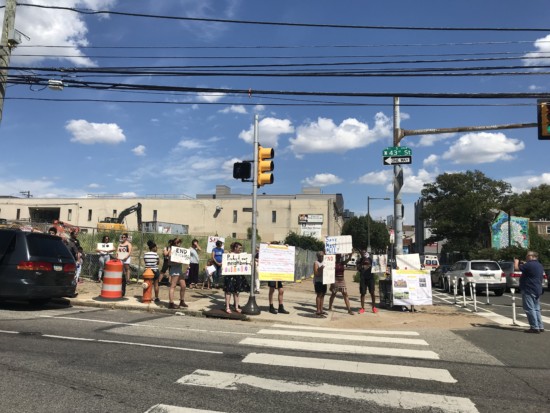
A couple dozen people – neighbors and members from groups “N.O.” (Neighbors Organized to Protect Our Communities) and West Philadelphians for Progressive Planning & Preservation – gathered on Sunday afternoon to protest the new residential developments at and around 43rd and Chestnut – the former site of the Christ Memorial Church demolished earlier this year, and at 12 S. 43rd Street.
The protesters held anti-gentrification signs and chanted “Say No to Gentrification! Say No! Say No! Say No! Philly Needs to Say No!” and marched along Chestnut Street between the two developments sites.
“We are witnessing our community is changing down a route only in favor of the developers,” Ang Sun, a member of “N.O.” and Sunday’s protest organizer, wrote in an email. “The city council needs to stop these greedy developers profiting from gentrifying our neighborhood.” The group is fighting against unaffordable housing, the elimination of parking and increasing traffic in the area.
“The city council needs to listen to the tenants and property owners in our neighborhood,” writes Sun, an assistant professor at Temple University who lives in the area. “The city council members are elected to serve Philadelphians. They need to listen to our feelings at least. That is why we want to voice our concerns loudly. The developers may argue it is the zoning codes. We get it. It is the codes, it is the law, however, it is not justice.”
The group is planning more protests in the future. A larger demonstration is being planned for this fall, according to Sun.






August 12th, 2019 at 3:40 pm
Who is being pushed out of a neighborhood because a structurally unstable church is being replaced with housing?
If not in this building, where will the hundreds of people live, and why is that better?
August 12th, 2019 at 3:56 pm
These protestors need to get lives already…
August 12th, 2019 at 8:07 pm
Please know that this was a protest not only about the church, but about development around the church. People who have been evicted from development occurring in the area have been in some cases put out on the streets, given Section 8 vouchers that are of little value since there is a very long waiting list, and since landlords are not interested in Section 8 residents when they can jack up the rents for the new demographic: https://www.nytimes.com/2018/10/12/us/politics/section-8-housing-vouchers-landlords.html
These are our neighbors. This is what gentrification looks like. Don’t turn your backs on them, please.
August 13th, 2019 at 2:14 pm
These gentrification arguments make no sense to me. The neighborhood has gone up and down then back over the last 100 years. The original plan was to have mix housing for people of different economic levels. This plan worked extremely well in my opinion. You can find a reasonably priced apartment in the neighborhood. House prices are not that crazy compared to other cities. The center of University City may be expensive but the edges are still reasonably priced. (Look to Grays Ferry if you want something cheaper.) It’s a great neighborhood, best in the country IMHO, most of us are diverse and welcoming. Stop yucking my yum.
August 13th, 2019 at 2:54 pm
Opposing new housing is not the way to fight gentrification. Opposing the removal of off-street parking is DEFINITELY not the way to fight it.
Adding housing units is the only way to keep rent affordable in the existing housing stock. The demand for housing in the neighborhood will be what it will be. If you want the high demand to keep from affecting long-time residents of the neighborhood, you need to provide housing for the people that want to live in the neighborhood.
To be fair to the activists, it is also true that without significant development of affordable housing alongside market-rate and above housing, eventually gentrification will push long-time residents out. That is where they should focus – on meeting with City Council, meeting with developers, pushing through all available avenues for the singular goal of getting developers to include more affordable units in their development plans.
But just holding rallies and protests against the whole idea of adding housing isn’t productive. It doesn’t do anything to actually address the problem, because additional housing development is a necessary part of the solution.
August 14th, 2019 at 8:04 am
The process of changing the character of a neighborhood through the influx of people is interesting. If the influx is affluent, the process is called gentrification. If the influx is poor, the process has a different name.
Feet are made for influxing.
Most people who have moved into West Philly in the last 10 years are at least affluent enough to move here. Shall we tell them to go back to where they came from? Or shame them by making them stand in line on the sidewalk with signs?
Affluent? not in my backyard!
August 14th, 2019 at 10:53 am
The neighbors were not opposing new constructions simply because they were new constructions. The neighbors were opposing thoughtless constructions only in favor of the developers. The neighbors want to have a say in how their community is developing. The developers were not listening! That is why the neighbors were organizing to do the demonstration!
Within a 4-block radius, there would be 15 new developments, over 2,000 units, probably over 6,000 people would move in. Who is going to pay for these new developments eventually? The student tenants! These students have already been burdened by student loans, and you greedy developers want to suck more blood from them!
August 14th, 2019 at 3:56 pm
Development in desirable neighborhoods *always* increases rents and housing values. There is virtually *no* legitimate scholarly research–or real-life experience–that suggests otherwise. You can either take your head out of the sand and look at all the cities and neighborhoods that have gentrified over the past few or several years: They are *all* more expensive. Or you can read scholarly work–where at best they say that prices will drop only if there is another recession (at which point we’ll widen the incredible gap between the haves and have-nots even more) or the point at which, as some predict, this poorly built housing deteriorates, right about the same time as the developers’ ten-year tax welfare expires, along with their write-off of the building’s depreciation. What’s happening now is worse than the Robert Moses Freeway Destruction of neighborhoods, and with the same zealotry and same ignoring of the very negative impact of what is being done to our neighborhoods. Don’t fall for it. Don’t accept the “studies” being sponsored by the development industry. Read and think and look around.
August 14th, 2019 at 6:17 pm
Good. I’m glad my properties are increasing in value. I pay more taxes to the city and the children get a better education with those tax dollars.
Why don’t you want our children to get a better education, Mr. Research? Do you hate children?
August 15th, 2019 at 5:28 pm
Goldenmonkey, you are truly a bad parent, if you put your children to public schools in Philadelphia. If you want your children to get a better education, you know you should not do that. You were trying to paint Urban Research as someone doesn’t care about children, but in reality, judging from your behavior, everyone here can tell you are the one
August 16th, 2019 at 8:30 am
My kid goes to Penn Alexander, a Blue Ribbon School. One of the best public schools in the country. Excellent staff and facilities. Art, library, music, all supported by the community.
Nice try though.
But let me get this straight: Are you suggesting that no responsible parent should send their children to public school in Philadelphia? LOL.
August 16th, 2019 at 10:53 am
Urban research, “desirable neighborhoods *always* increases rents and housing values”. It doesn’t matter if development happens. If people desire to live in a neighborhood, they’ll offer to pay more and the prices go up
August 16th, 2019 at 1:05 pm
We’re lucky to be blessed with such geniuses here as Demand to explain things to us. Now we know it doesn’t matter if development happens. They make everything sound very simple.
August 16th, 2019 at 3:24 pm
A.A- It isn’t about the development, it is about the desirability. Once folks want to live in a neighborhood, there is nothing you can do to stop that housing demand (short of things that erode the quality of life for everyone). New buildings going up do not cause rents to go up, rents go up causing new buildings to go up.
So, back to the first commentor’s question- where should all the new folks that want to live in our neighborhood live instead, and why is that better?
We have an example of what happens when there is neighborhood desirability and no new construction- San Francisco. Is that what we want for West Philly?
August 17th, 2019 at 4:09 am
Mr. Cyrus is not dead. It had nothing to do with his sudden eviction from the Arvilla. The other residents were not evicted either- not majority poor, people of color.
The many, many residents of the Dorset were not the targets of a sudden eviction plan either.
Rents are not going up drastically in the Baltimore Avenue corridor.
Besides, all this is profitable, if you’re an owner.
August 17th, 2019 at 7:32 pm
One person asks, like Christopher Columbus, “Where will all the affluent white people live if they can’t live wherever they’d like?” “Why can’t we live wherever we want?”
Obviously, affluent whites can indeed live wherever they want. When they decide they don’t want to live around black people, they impose Jim Crow, redlining, moves to the suburbs, expressways to break up black neighborhoods. When they decide they’re tired of the suburbs (“so boring! let’s go to the City!”) they head back to the city for a cheap property and a smidge of diversity–oh so exciting!–but notice that they never move into fully black neighborhoods, no no, there always have to be a modest percentage of whites because most gentrifiers are fearful and racist in their heart of hearts. They think they’re “improving” the neighborhood by making it as dreary as the suburbs from which they fled (after they ruined those). Affluent whites have been a destructive force against people of color and the environment for a very long time. Not consciously–worse, they are asleep; asleep to the damage they do; asleep to their sense of entitlement; asleep to the possibility they could do better. So if affluent whites want to do better, those who are awake or at least trying to shake off years of unconscious racist habits and sense of entitlement, they could stop gentrifying and start helping people of color, black people in particular, to remain in their neighborhoods with affordable rents, mortgage support, whatever it takes to repair the atrocities, far greater than those committed in the Holocaust or any other such in history. Such a small thing to ask: allow black communities to have stability and build wealth. Allow black communities to have access to good schools, to neighbors they know and trust, a clean and safe environment. Stop yourself from elbowing into “desirable” neighborhoods. You are not children who must have the latest toy. There are plenty of places to live in the City of Philadelphia. This crisis of gentrification can be a radical moment of reparation, of action, for those who want to make real change, who want to do something meaningful to make this country a better place for all of us.
August 18th, 2019 at 12:24 am
I only skimmed that screed but my favorite/most ironic pet is “ There are plenty of places to live in the city of Philadelphia.”
August 18th, 2019 at 4:13 am
Wherever there is injustice, there are those who claim that there is no alternative, those who would naturalize social violence. These voices serve to obscure the role of human agency in creating a more just world. They would leave us with an outlook defined by little more than the pursuit of greed,social privilege and the like.
We need instead more to speak like MLK did before he was killed:
I’d like for somebody to say that day that Martin Luther King, Jr., tried to love somebody.
I want you to say that day that I tried to be right on the war question.
I want you to be able to say that day that I did try to feed the hungry.
And I want you to be able to say that day that I did try in my life to clothe those who were naked.
I want you to say on that day that I did try in my life to visit those who were in prison.
I want you to say that I tried to love and serve humanity.
Yes, if you want to say that I was a drum major, say that I was a drum major for justice. Say that I was a drum major for peace. I was a drum major for righteousness. And all of the other shallow things will not matter. I won’t have any money to leave behind. I won’t have the fine and luxurious things of life to leave behind. But I just want to leave a committed life behind. And that’s all I want to say.
https://www.youtube.com/watch?v=SSyt4Egz4DY
August 18th, 2019 at 1:14 pm
Today I learned that being asked to leave the property you don’t own is “social violence”.
It amazes me how glibly people will throw around terms ignoring the fact that they’re robbing those words of their impact.
August 18th, 2019 at 3:35 pm
Wherever people are being squeezed, dehumanized, evicted and/or exploited, people are pushing back:
SMASH THE MACHINE
BY TAKE BACK THE BRONX / JUNE 25, 2019
Toward Community Control
To stop gentrification, we have to cancel projects like neighborhood rezonings and luxury developments, and begin taking community control of land and housing. We have to build tenant unions, march on landlords, block evictions, and take over run-down or vacant buildings. With each step forward, we also have to secure protections such as expanding rent control, granting tenants ownership of slumlord properties, repairing NYCHA, and so on. The Bronx political machine will never embrace these measures, since its power depends on collaborating with capitalists rather than overthrowing them. And individual politicians will rarely defy the machine consensus, since their careers depend on securing favors, appointments and endorsements from party bosses. To win reforms, we will have to smash the machine entirely.
Read more: http://www.bronxsocialcenter.org/2019/06/25/smash-the-machine/
August 21st, 2019 at 1:01 pm
Bottom line – the building is a by right construction project which completed CDR recently after the developers spoke to the community.